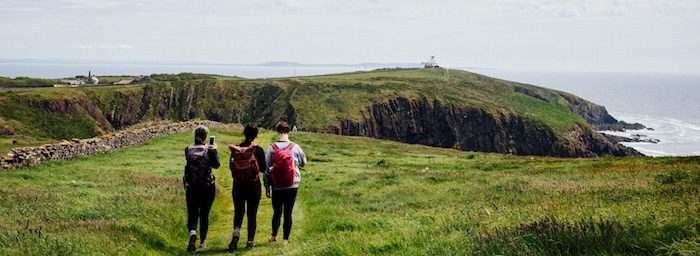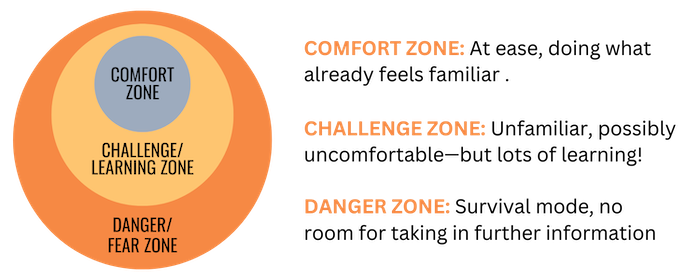
It is easy, it is relaxing, it is…well, very comfortable. It is important for us to occupy our comfort zones regularly: a comfort zone minimizes stress and anxiety, gives us a sense of control over our lives and environments, and allows us the satisfaction of feeling like we have enough—love, support, nourishment, care—even for just a moment. This is an essential space for humans to maintain if we don’t want to exist in a constant state of adrenaline- and cortisol-fueled movement through the world.
In a world seeing expanding rates of clinical anxiety and a heightened awareness of the negative physiological effects of prolonged stress on the human body, “stress” and “anxiety” often come with negative connotations. As a result, we live in a society that frequently tells us to minimize stress as much as possible: AVOID stress in order to protect yourself from physical and psychological harm.
On one hand, yes. Yes, stress can be harmful. Yes, we live in a world that manufactures unnecessary stress in the way we structure our educational systems and work lives. On the other hand, while we wholeheartedly believe that physical and psychological safety are paramount, we also believe that uncomfortable is too often conflated with unsafe. We argue that it is possible for discomfort to be experienced as a form of CHALLENGE, rather than RISK. Just because something is difficult, does not mean it is unsafe—on the contrary, we think that individuals must regularly choose to confront difficulty and challenge if we want to continue growing and maturing, and if we want to truly embody the spirit of “lifelong learning” that gap years represent.
The challenge lies in identifying the learning zone between COMFORT and DANGER.

Every person has different thresholds when it comes to their levels of comfort and challenge, and those thresholds will continue to shift as a person gains new experiences. When students are thinking about goals for their gap year, we encourage them to identify experiences that will push them out of their comfort zone and into their “challenge zone,” which is where the most transformative learning will take place. We ask them to consider intentional questions like:
- What are some areas I would like to grow in?
- What are some things I’ve never experienced, but feel exciting to think about?
- What are some experiences that might feel uncomfortable at first, but that will be enriching for me in the long run?
At the same time, it is equally important to identify where the limits of one’s challenge zone are: there may be experiences that go too far, and that trigger a panic or fear response. This is the “danger zone,” where a person may start to experience trauma, and where productive learning is no longer possible. It is important to steer clear of the danger zone, and to try to keep experiences within a healthy balance of one’s comfort and challenge zones.

A growth mindset allows a person to view challenges as opportunities for growth, rather than barriers; to accept feedback as helpful and constructive, rather than critical; to view new experiences as exciting, rather than scary; and to think of their own abilities as having endless potential, rather than being predetermined. A growth mindset is essential for a spirit of lifelong learning that will continue long after a gap year experience.
It is this spirit of lifelong learning that we are celebrating with GYA’s Experiential Challenge Campaign, in which members of the GYA community are pursuing individual growth challenges in order to raise funds for GYA’s work in gap year advocacy (including a new gap year scholarship!) while embodying a gap year growth mindset. It is inspiring to see the range of different challenge zones that participants are entering:
GYA’s founder and Director of Accredited Gap YEar Program Carpe Diem Education Ethan Knight will be doing a standup comedy routine
GYA’s Executive Director Keri McWilliams is hiking “a peak a week” throughout the 10-week campaign
Accredited Gap Year Consultant and GYA Board Member Julia Rogers is preparing for her first-ever skydiving adventure
GYA Vice President Sandy Storer is pursuing a meditation challenge with a “month of mindfulness”
Gap Director at Accredited Gap Year Program ARCC Gap Emily Rosser is biking 360 miles down the Oregon Coast
Accredited Gap Year Consultant and GYA Board Member Jason Sarouhan is preparing to run a 50-mile traverse of the White Mountains
Gap Year Consultant and Trek Epic Founder/Guide Andrew Bryan is preparing for a 16-mile open water swim along the Baja Peninsula
Accredited Gap Year Program Irish Gap Year Founder/Director Ryan Allen will be planting 500 native trees in a single day for a carbon-capturing reforestation project
Gap Year Consultant Erica Vaughn has committed to a different community service project every week of the 10-week campaign
Executive Director of Rooted Life Adventures Austin Rogers will be doing a Flying Trapeze in the Costa Rican jungle with Rooted Life’s Teen Girl Summer Camp
Feeling inspired? Our 2024 Experiential Challenge Campaign will be running through August 2024, and we invite you to JOIN THE CAMPAIGN with your own growth challenge if you feel moved to do so. You can also select any number of the individual challenges above to support.

The great thing about spending time in the challenge zone is that the comfort zone will follow: the more we try new things, the more comfortable those things will become. Eventually, they’ll become a part of your growing comfort zone as you continue to seek new challenges and opportunities for growth. Intentional gap years are all about setting the stage for a dynamic life of continued growth and learning.
Categories
- Advising (7)
- Alumni (2)
- Career (5)
- College & University (15)
- Communication (17)
- DEIA (4)
- Fair Trade Learning (3)
- Finances (12)
- Gap Year Benefits (69)
- Growth & Development (9)
- Leadership (6)
- Learning & Reflection (56)
- Mental Health (4)
- Planning (61)
- Professional Development (5)
- Research (4)
- Risk Management (3)
- Safety (5)
- Service-Learning (10)
- Standards & Accreditation (1)
- Sustainability (6)
- Voices Project (20)
